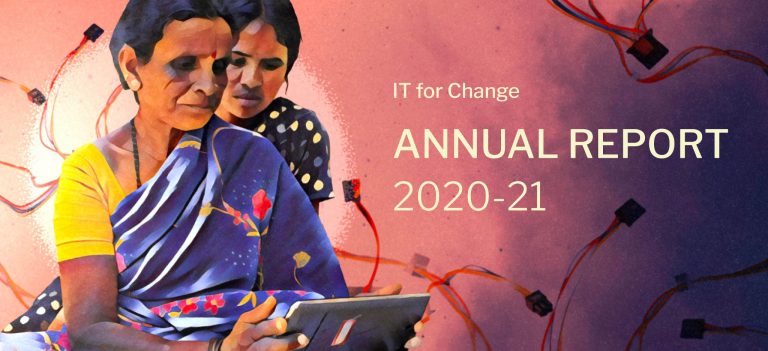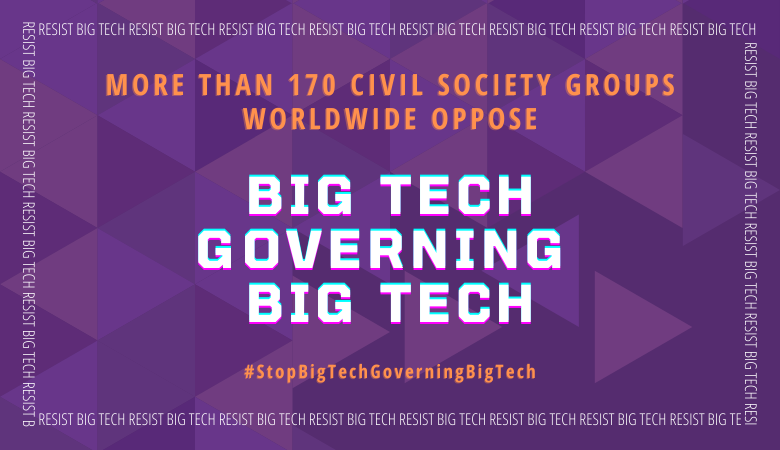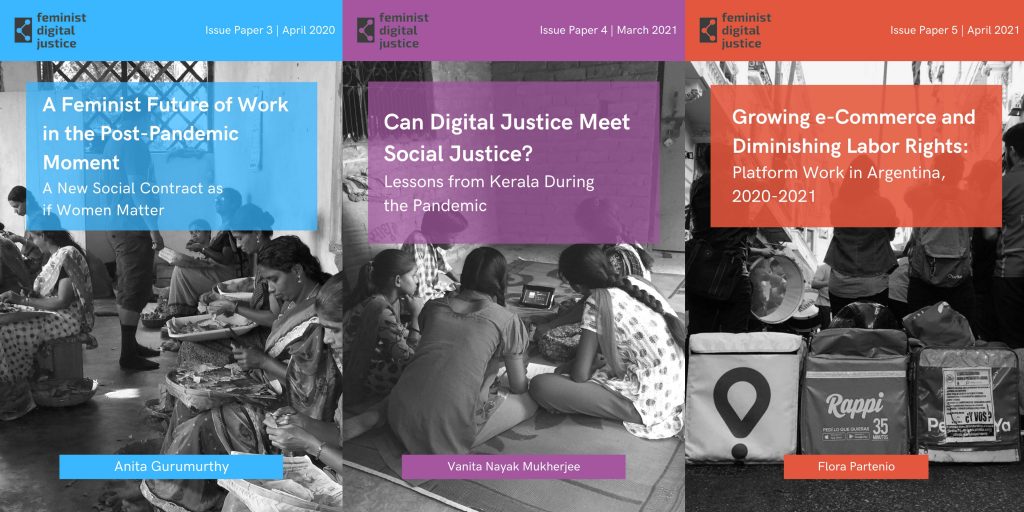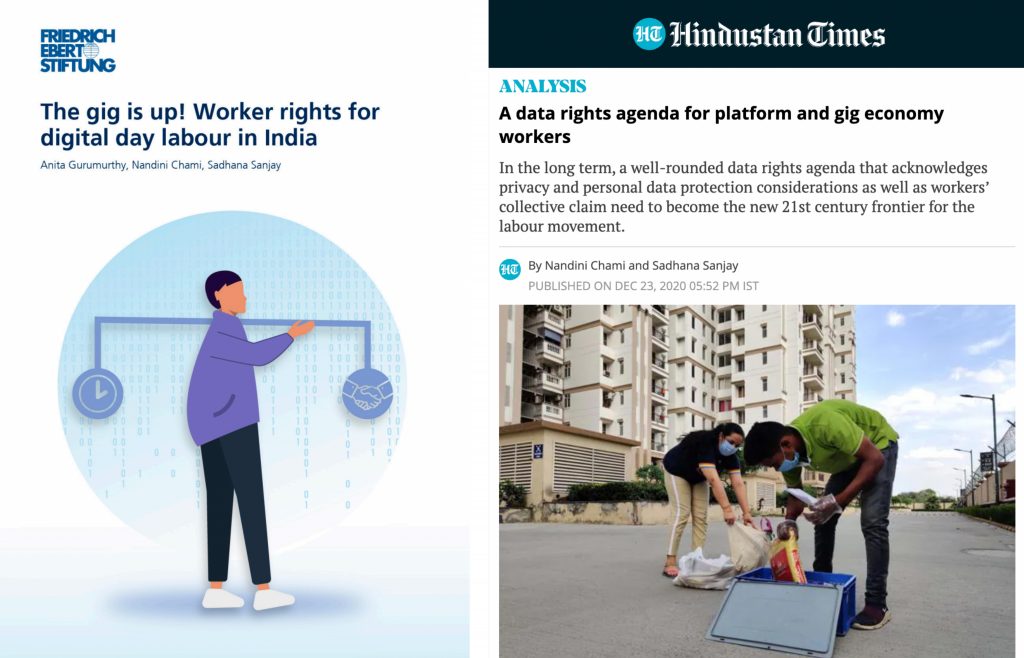
Democratizing Digital Justice
Exploring the intersections between digital rights and development justice has been the primary focus of our research, advocacy, and field-building efforts. As the digital permeates multiple national and international development domains, it is vital that civil society actors build informed and critical perspectives. Neither glib solutionism nor blanket pessimism will be productive. Therefore, our effort has been to turn to normative ideas underpinning digital justice, interpreting such norms from the standpoint and through the participation of people’s movements from the Global South. We believe it is necessary to urgently move the conversation towards democratic institutional frameworks for digital governance from global to local levels. Our alliance and knowledge-building efforts have attempted to address this imperative, weaving into social movement agendas and mainstream development policy dialogues the connections between digital justice and an equitable international political-economic order.
Campaign against UN SG Proposal for Global Digital Cooperation
In early 2020, the UN Secretary-General (UN SG) came out with a detailed policy roadmap aimed at addressing existing gaps in global digital governance arrangements, particularly the inability of the UN Internet Governance Forum (IGF) to produce meaningful and binding outcomes. The roadmap called for the creation of a ‘strategic’ and ‘empowered’ multistakeholder high-level body, financed mainly through non-UN private sector funding, to coordinate follow-up actions from the IGF and communicate proposed policy approaches and suggestions to relevant forums. As IT for Change and other member organizations of the Just Net Coalition noted, this development was a slippery slope to the direct entrenchment of corporate power, particularly of transnational digital corporations, in pivotal multilateral policy processes, where norms are forged for our collective digital future.

IT for Change and other Just Net Coalition members launched a campaign against the proposal in March 2021, when a public consultation on the institutional framework for the high-level body was announced by the Multistakeholder Advisory Group of the UN IGF.
We wrote an open letter to the UN SG opposing the plans for establishing a Big-Tech-dominated body for global digital governance and launched a campaign that saw 170 civil society organizations worldwide endorsing the letter. Building on our learnings from this experience, we authored a journal article for a special issue of Development, focused on a new agenda for UN75, arguing for the urgent imperative to build a new radical global constitutionalism, breaking away from the corporate capture of rule-making for the digital.
A Digital New Deal: Visions of Justice in a Post-Covid World
In July 2020, we supported the Just Net Coalition (JNC) on A Digital New Deal, a thoughtfully curated project that brought together leading thinkers, activists, and practitioners to reflect on the idea of digital justice. The essays from this project provided the much-needed North Star for global civil society, interrogating the idea of ‘building back’ and ‘recovery’ in a digitalizing world of deep inequality. The collection took note of the pandemic and its debilitating aftermath, and articulated the building blocks of an alternative vision for our digital ecosphere. The collection provided pathways out of the dominant digital frame towards justice and equity, covering diverse topics from the digitalization of agriculture and food systems to issues of social protection, current stalemates in multilateral norm-building, and the fight against Big Tech. The series was officially unveiled by the Just Net Coalition in November 2020, at a pre-event during the UN IGF, and later released as a compendium. It has received wide acclaim from multiple constituencies the world over and has been downloaded nearly 3000 times, with the essays on the project site pulling nearly 10000 unique visitors.
The Davos Diaries for a New Multilateralism
In January 2021, IT for Change released the first miniseries of its Bot Populi Podcast. The initiative was part of a global effort by a coalition of civil society organizations and trade unions to coincide with the annual meeting of the World Economic Forum (WEF) in Davos, Switzerland. Titled The Davos Diaries, the miniseries brought together prominent scholars and activists Barbara Adams, Chee Yoke Ling, Harris Gleckman, Jim Thomas, Renata Avila, and Roberto Bissio, (along with IT for Change’s Parminder Jeet Singh), to critically unpack the WEF’s agenda. The podcast explored the broad trends in multilateral norm-building, and the ‘digital reset’ issues implicated in the discussions at the Davos 2021 summit. The series was released throughout the course of the week of the WEF meetings and supplemented with a social-media campaign. These advocacy efforts culminated in a webinar jointly organized by a coalition of global civil society organizations titled The Great Take Over: How We Fight the Davos Capture of Global Governance. The podcast, a first of its kind media product for IT for Change, had an impactful run, with the Davos Diaries series raking in close to 550 downloads and listens across platforms.

Alliance-Building on Feminist Digital Justice
As part of the Global Working Group on Feminist Visions of the Future of Work, supported by Friedrich-Ebert-Stiftung (FES), we co-evolved an action framework for policy and programming towards gender-just digital economies with leading feminist scholar-practitioners from Asia, Africa, Europe, and Latin America. The action framework argues for a three-pronged agenda of building back a new multilateralism for furthering development in the digital age, ensuring Big Tech accountability for protection and promotion of women’s human rights, and global and national support for creating feminist digital and data infrastructures. It was launched at the Global South Women’s Forum 2020 hosted by International Women’s Rights Action Watch Asia Pacific (IWRAW Asia Pacific).
We continued our collaboration with Development Alternatives with Women for a New Era (DAWN) on Feminist Digital Justice. IT for Change and DAWN team members produced think pieces on the need for a new social contract that ensures full social and economic citizenship for the most marginalized women, the consequences of the pervasive digitalization of public services during the pandemic, and rising tensions between labor and capital in the platform economy.

Integration of Data Perspectives into Health and Biodiversity Domains
We were invited by Transform Health, a global coalition committed to achieving the Sustainable Development Goal (SDG) of universal health coverage using digital technologies and data, to join their working group on evolving principles for health data governance. We have managed to bring in an innovative framework for simultaneously thinking about individual and collective rights in health data, with respect to protection from harm and benefits sharing of data value. The principles will be finalized and released in 2021.
At the national level, we have been closely tracking the National Digital Health Mission’s efforts to roll out a country-wide public health data infrastructure. Our response to the public consultation on the Draft Health Data Management Policy calls attention to the lack of adequate safeguards to prevent personal data protection violations and corporate capture of health data resources in the institutional governance arrangements that are proposed. We have shared our analysis with health rights activists in the country through dialogues and conversations with the People’s Health Movement.
We were invited by the Third World Network (TWN) to support their ongoing global advocacy efforts around the emerging Post-2020 Global Biodiversity Framework, specifically to input into the construction of their policy position on digital sequence information (DSI) of genetic resources. We provided our perspectives on the intersections between cross-border regulation of data flows and appropriate access and benefits sharing regime for DSI at TWN’s learning session for the global community of biodiversity activists and also co-organized an expert webinar focused on the global democratic governance of digital genomics.
New Horizons for Labor Rights in the Digital Age
The global pandemic threw into sharp relief the abject exploitation of labor in digital value chains. For May Day 2020, we came out with a special series on labor, digital economy, and Covid-19 for Bot Populi, with contributions from leading researchers, civil society practitioners, and trade union representatives. We also continued dialogues on new frontiers for labor rights in the 21st century, not only to re-articulate social protection nets for workers in the digital economy, but also to draw attention to workers’ data rights. With international trade union federations such as the Public Services International and global initiatives such as Reshaping Work, we continue to shape this vital agenda.
We engaged on the frontlines of critical national-level debates on the future of workers’ rights. In early 2020, India carried out a landmark project of labor law reform, harmonizing and re-casting 44 different central laws into four codes: wages, industrial relations, social security, and occupational safety, health and working conditions. We analyzed this development from the standpoint of the burgeoning class of digital day laborers, India’s rapidly expanding platform workforce, and found it wanting. To highlight the shortcomings of the new labor codes and desirable future pathways for extending foundational labor rights to all workers, we produced a research paper and published op-eds in the FES International Trade Union Policy Blog and the Hindustan Times.
We forged a coalition of trade unions and civil society organizations in India, working on platform workers’ rights to influence the ongoing policy dialogue. Working closely with the All India Gig Workers Union, Indian Federation of App-based Transport Workers, Aapti Institute, the Centre for Internet and Society, Tandem Research, and TWN Trust, we co-drafted and submitted an input to the Ministry of Labour and Employment on the draft Code on Social Security Rules, 2020 in December 2020. Our input was extremely well-received and widely covered by media outlets such as The News Minute, NDTV, News Click, Money Control, and others.

Impact
The impact of IT for Change’s work in deepening the digital justice debate is visible across a variety of different fronts this year, from the immense positive feedback we received at events, the ways in which we were able to initiate new conversations and steer the discourse on particular issues through our extensive advocacy, and the many requests we have received to participate in novel initiatives within a rapidly expanding network of allies and associates.
We were invited to engage with grassroots efforts for social justice such as the Janta Parliament, the online World Social Forum 2021, the South Asia People’s Forum on the SDGs, and the Campaign of Campaigns.
Despite the constraints on organizing physical events in the pandemic year, we were part of over 70 online panels, learning sessions, and dialogues in global civil society circuits. Our collaborators included leading international civil society organizations such as Transnational Institute, Third World Network, Asia Pacific Forum on Women, Law and Development, the Feminist AI research network (A+ alliance), the Women’s Working Group on Financing for Development, London International Development Network, Open Democracy, and the Business and Human Rights Resource Centre and the Center for Alliance of Labor and Human Rights (CENTRAL).
Our presence in official panels in critical multilateral forums – the UN Internet Governance Forum, the Civil Society Forum of the UN Commission for Social Development, the UN South Asia Forum on Business and Human Rights, the Generation Equality Forum (Mexico) convened by UN Women, the ILO Coop 100 Symposium, and the Science and Technology Constituency of the Regional Asia-Pacific Civil Society Engagement Mechanism – suggest the value and relevance of the positions we bring to the table in the digital justice domain.
Our expertise has also been sought for capacity-building lectures, masterclasses, and other forms of pedagogic engagement in academic spaces nationally and globally. In March 2021, our Executive Director, Anita Gurumurthy, was invited to deliver the keynote at the University of Tokyo for the inaugural event of the B’AI Global Forum. We also received invites from the Indian Institute of Management and the Indian Institute of Science, Bengaluru; the Centre for Communication Governance (NLU Delhi), Azim Premji University, and the University of Calicut. At the international level, we were invited to provide an expert input to the Online Winter School of the University of Padova.
Plans for 2021-22
We intend to continue our campaign against the Big Tech capture of global digital governance arrangements with the Just Net Coalition, closely tracking the rollout of the UN SG Roadmap for Digital Cooperation and the intersections of digital governance with other critical multilateral processes such as the Post-2020 Biodiversity framework and health data governance at the WHO. We propose to embark on a dedicated line of action for the governance of social media platforms, engaging in research, and alliance-building at the global level.
We will deepen our engagement with traditional civil society organizations and social movements to democratize narratives of digital justice, combining forces with the Just Net Coalition to set up issue-specific working groups. Bot Populi, the alternative media that we co-founded, will play a major role in our strategy for building an alternative, South-centered discourse on a just and equitable digital future, grounded in the standpoints of people’s movements. We will expand our strategy for the Bot Populi Podcast and strengthen its content tracks under Big Tech Watch, the New Precariat, and the Feminist Observatory of the Internet. At the national level, as the pandemic eases, and restrictions are lifted, we hope to initiate community labs, learning sessions, and short workshops on the implications of current trends in national digital/data policies for just digital futures, with trade unions, farmers’ cooperatives, small traders’ groups, and health activists.

